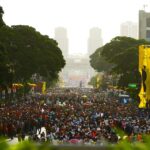People blocking a road in Zulia state. Photo: El Regional del Zulia.
Caracas (OrinocoTribune.com)—The Venezuelan Ministry for Interior Relations, Justice, and Peace announced that it will address the concerns of Yukpa Indigenous peoples from the Yaza, Macoita, and Toromo basins of the state of Zulia, Venezuela, who, since last Friday, have been demonstrating and erecting roadblocks between Machiques de Perijá and Villa del Rosario in the state of Zulia, near the border with Colombia.
The Yukpa claim that they want to go to Caracas to sell handicrafts. Given this situation, various government mechanisms were activated to address this situation, government sources explained. Simultaneously, police and military security agencies were deployed on the Villa del Rosario road to dissuade the group from blocking the road.
Due to the refusal to unblock the road, Indigenous leaders were invited to a meeting last Saturday, April 6, at the Lorenzo Parra sports field located in the central area of Machiques de Perijá. The Yukpa representatives did not attend this meeting and opted to maintain the roadblock.
The meeting was attended by activists representing communes, grassroots culture, education, food, and healthcare activists and representatives of the Federal Government Council, Communal Gas, Public Ministry, Comprehensive Defense Operational Zone, and Ministry of the Interior. Two vice ministers of the Ministry of Indigenous Peoples were also present.
The chief of the Chaktapa community, Sabino Romero, told Radio Fe y Alegría that the community wants to meet directly with Deputy Diosdado Cabello and the Minister of Electrical Energy Néstor Reverol so that they can provide an explanation of why they do not want the indigenous people to go to Caracas to raise their concerns and sell their crafts.
“I believe that this is the moment to have a conversation with Diosdado Cabello, with Minister Néstor Reverol, even with Minister Clara Vidal herself [Minister for Indigenous Peoples], to find out why every time the Indigenous people go to Caracas, they block our way,” said Romero, claiming that they are not the ones blocking the roads.
Among the complaints made by Indigenous peoples are requirements on healthcare, education, housing, public services, food, roads, and social care in general. They are demanding to speak with PSUV deputy Diosdado Cabello after President Maduro appointed Cabello as head of his presidential campaign for Zulia state. Some analysts believe that this may indicate possible connections to the electoral campaign behind this new mobilization by this group of Yukpa organizations.
According to Ultimas Noticias, intelligence agencies have detected plans to carry out violent actions by the protest leaders identified as Sabino Romero (son), Alfonzo Romero Ramos, Decio Romero, Olegario Romero, and Gerito Vargas. Such plans are not known to the majority of the Indigenous people who are protesting.
Inhabitants of the town of Machiques have been denouncing a marked reduction in the supply of food, medicines, and energy to the region, as well as to the normal commercial transit of goods and services that normally use this road, the Troncal 6.
This Friday, April 12, the mayor of Rosario de Perija, Ely R. Atencio (opposition), posted a video on social media platforms announcing that the municipality is heading toward collapse due to the Yukpa protest. Simultaneously, the editor of the Chavista outlet La IguanaTV, with Zulian roots, posted another video referring to the roadblocks carried out by some Yukpa leaders as guarimbas.
Background
In June 2023, a group of Yukpa Indigenous people led various protests to demand that the authorities respect their rights and that the state guarantee food and services for the members of these communities.
The Indigenous spokespersons organized themselves because they expressed feeling “deceived” and “forgotten” by the authorities at the national and regional levels. Although the demonstrations began on June 4, the conflict escalated on June 12 after anti-riot groups prevented Indigenous groups from moving towards Caracas.
Among their demands, the Yukpas demand that the state offer them an alternative to generate income from their regions. Those affected report that their main source of work is the sale of crafts, which has decreased due to a lack of tourists in the state.
On June 15, 2023, the Venezuelan government announced a “comprehensive response” plan to address the demands of the Yukpa Indigenous people. Some Yukpa communities have protested, asking that they be allowed to sell their handicrafts in Caracas, among other demands.
In a statement on Thursday, June 15, it was reported that Interior Minister Remigio Ceballos has met with Yukpa and other indigenous communities’ leaders from Zulia to listen to their demands and “guarantee the deployment of public policies of the Venezuelan government to properly take care of the Indigenous communities in the region.”
According to Venezuelanalysis, on June 15, Zenaida Romero, her husband Alfonzo Ramos Romero, and Francisco Romero were arrested after the National Bolivarian Police (PNB) confronted a group of Yukpas on the General Rafael Urdaneta Bridge across the Maracaibo Lake after blocking the Yukpas from crossing on their way to Caracas.
“The three were arbitrarily detained while they were protesting for their right to travel to Caracas to sell their handicrafts,” activist and lawyer for the Yukpa people, Sergio Zambrano, then told the local press during a rally in front of the Palace of Justice in Maracaibo, Zulia’s capital.
Historically, the Yukpa people have struggled against landlords in the region, but after the arrival of Chavismo, the majority of the Indigenous communities have regained their ancestral rights. In recent years, the Yukpa community has launched more protests against the Venezuelan government than they had against the landlords who treated them like second-class citizens until the arrival of Chavismo.
Yukpa children poisoned in Colombia
Meanwhile, on the other side of the border, in Colombia, six governors of the Yukpa People’s Council of the Serranía del Perijá announced, in a statement, the breaking of relations with the justice system due to its failure to, according to them, clarify the causes of the death of five children of the ethnic group, Radio Nacional de Colombia reported.
On Sunday, March 24, five Yukpa children died in the Agustin Codazzi municipality, Cesar Department of Colombia, allegedly due to food poisoning. The five children, belonging to the same household, died allegedly after consuming corozo fruit. Indigenous leaders question the cause of the tragedy. This Yukpa community is approximately 100 km away from the Zulia state roadblocks.
“The institutions left us alone in the tragedy caused by the murder of our five Yukpa children. The relations of our Indigenous jurisdiction with the Attorney General’s Office and the National Institute of Legal Medicine and Forensic Sciences are broken,” the statement reads.
They assure that, thus far, they have received the support of the Vice Minister for Social Dialogue, Equality, and Human Rights Lilia Solano, as well as the actions of the Constitutional Court, the Council of State, and the Administrative Court of Cesar, which have issued rulings in favor of the Yukpa people; however, support from other authorities is lacking.
“Despite the commitments made with the high dignitaries of Colombia, 16 days have passed since our children were murdered and we have not met with the attorney general, Luz Adriana Camargo,” nor with other officials, the statement underlines.
Special for Orinoco Tribune by staff
OT/JRE/SL





